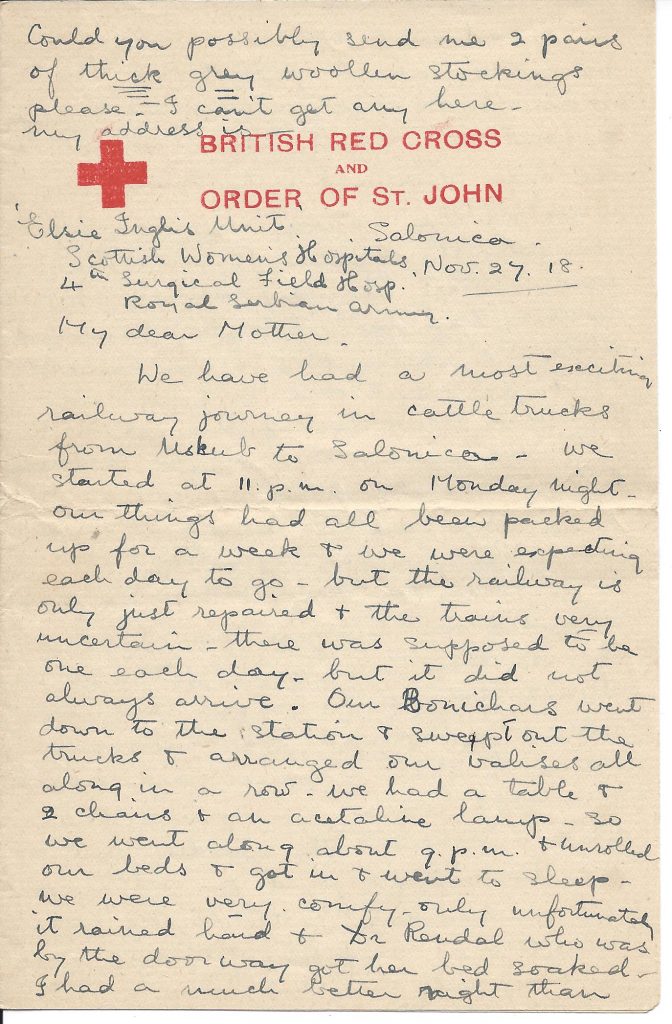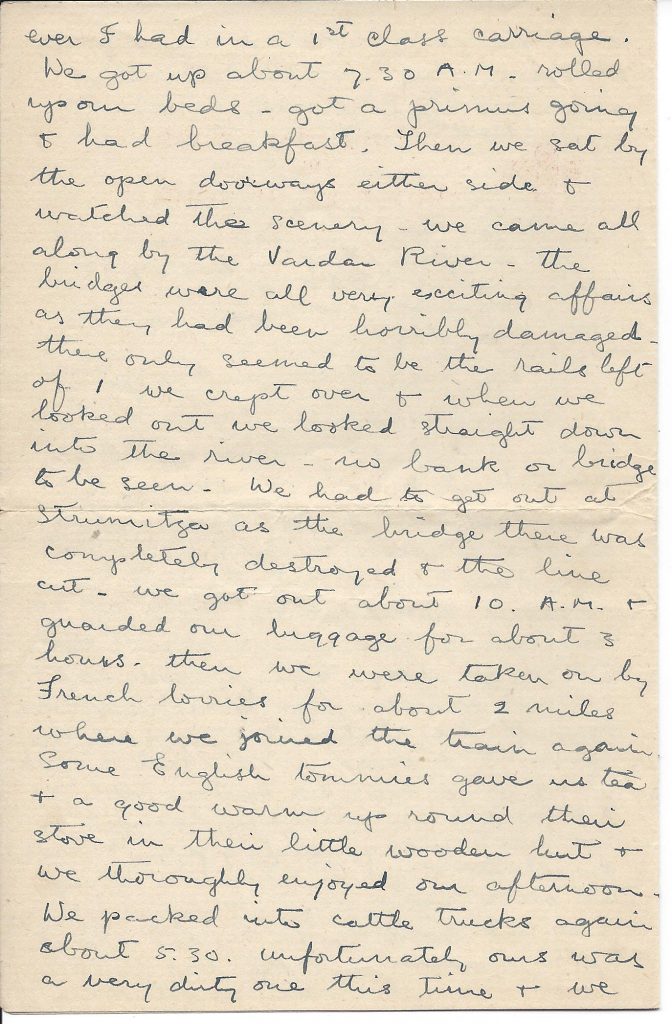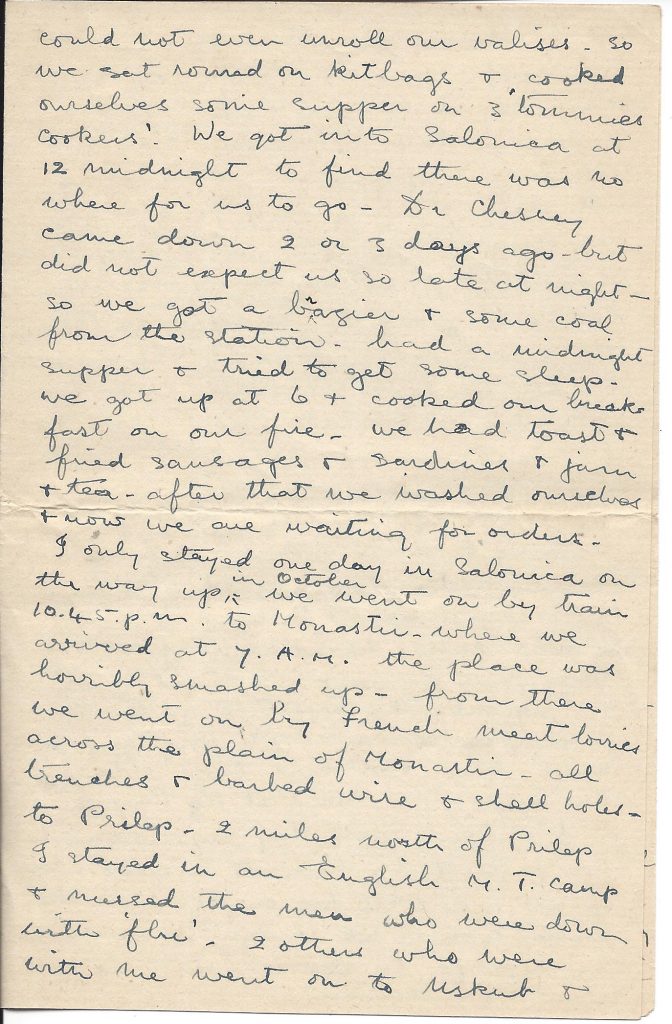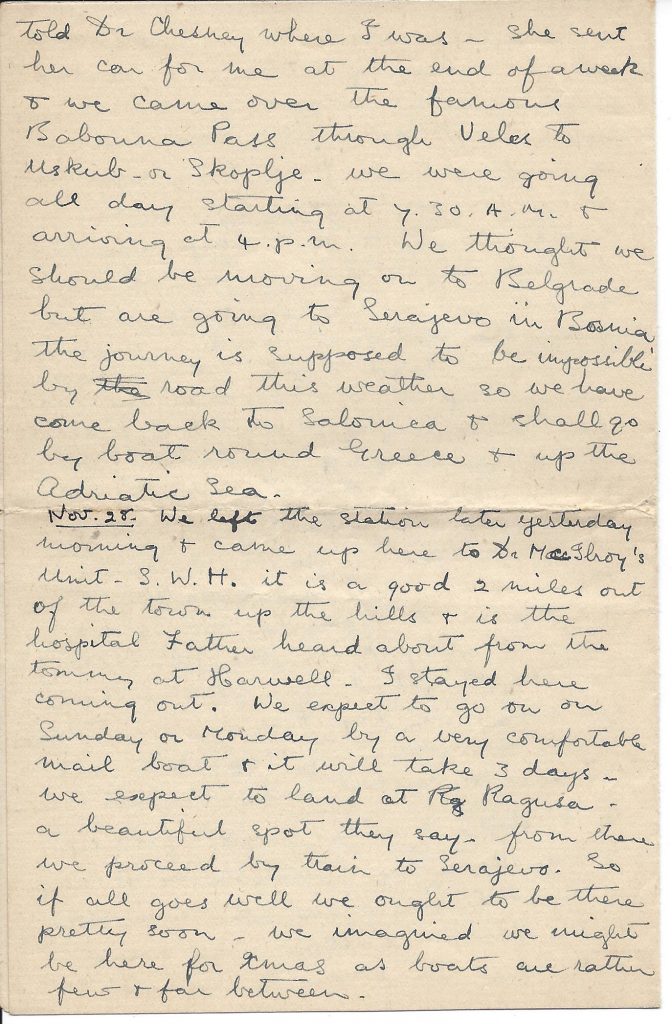My Great Aunt, Margaret Ada Box, braved the Serbian winter to work as a Red Cross Nurse with the Elsie Inglis Unit of the Scottish Women’s Hospitals at the tail end of the First World War in 1918. Here follows one of the letters she wrote home, describing her adventures as one of a number of brave young women, who were not content to sit at home while the men ‘did their bit’ – of course many of the men were also facing danger and death, and I suspect everybody who returned from the war was a different person from when they went out.
Could you possibly send me 2 pairs of thick grey woollen stockings please. I can’t get any here. My address is.
‘Elsie Inglis Unit
Scottish Women’s Hospitals
4th Surgical Field Hosp.
Royal Serbian Army
My Dear Mother,
We have had a most exciting railway journey in cattle trucks from Uskub to Salonica. We started at 11 p.m. on Monday night. Our things had all been packed up for a week & we were expecting each day to go, but the railway is only just repaired & the trains very uncertain. There was supposed to be one each day, but it did not always arrive. Our Bonichars went down to the station & swept out the trucks & arranged our valises all along in a row. We had a table & 2 chairs & an acetylene lamp. So we went along about 9 p.m. & unrolled our beds & got in & went to sleep. We were very comfy , only unfortunately it rained hard & Dr. Rendel who was by the doorway got her bed soaked. I had a much better night than ever I had in a 1st class carriage.
We got up about 7.30 a.m. rolled up our beds, got a primus going & had breakfast. Then we sat by the open doorways either side & watched the scenery. We came all along by the Vardar River. The bridges were all very exciting affairs as they had been horribly damaged. There only seemed to be the rails left of 1 we crept over & when we looked out we looked straight down into the river. No bank or bridge to be seen. We had to get out at Strumitza as the bridge there had been completely destroyed & the line cut. We got out about 10 a.m. & guarded our luggage for about 3 hours, then we were taken by French lorries for about 2 miles where we joined the train again. Some English tommies gave us tea & a good warm up round their stove in their little wooden hut & we thoroughly enjoyed our afternoon.
We packed into cattle trucks again about 5.30. Unfortunately ours was a very dirty one this time & we could not even unroll our valises. So we sat around on kitbags & cooked ourselves some supper on 3 ‘tommies cookers’. We got into Salonica at 12 midnight to find there was no where for us to go. Dr Chesney came down 2 or 3 days ago but did not expect us so late at night, so we got a brazier & some coal from the station. Had a midnight supper & tried to get some sleep.
We got up about 6 & cooked our breakfast on our fire. We had toast & fried sausages & sardines & ham & tea. After that we washed ourselves & now we are waiting for orders.
I only stayed one day in Salonica on the way up in October. We went on by train 10.45 p.m. to Monastri, where we arrived at 7 a.m. The place was horribly smashed up. From there we went on by French meat lorries across the plain on Monastir – all trenches & barbed wire & shell holes to Prilip. 2 miles north of Prilip I stayed in an English M.T. camp & nursed the men who were down with ‘flu’ . 2 others who were with me went on to Uskub & told Dr. Chesney where I was. She sent her car for me at the end of a week & we came over the famous Babouna Pass through Velez to Uskub or Skopje. We were going all day starting at 7.30 a.m. & arriving at 4 p.m. We thought we should be moving on to Belgrade but we are going to Sarajevo in Bosnia. The journey is supposed to be impossible by road this weather so we have come back to Salonica & shall go round by boat round Greece & up the Adriatic Sea
Nov 28. We left the station later yesterday morning & came up here to Dr. McIlroy‘s unit. S.W.H. it is a good 2 miles out of the town up the hills & is the hospital Father heard about from the tommy at Harwell. I stayed here coming out. We expect to go on on Sunday or Monday by a very comfortable mail boat & it will take 3 days. We expect to land at Ragusa, a beautiful spot they say. From there we proceed by train to Sarajevo. So if all goes well we ought to be there pretty soon. We imagined we might be here for Xmas as boats are rather few & far between.
Notes
The paragraph which starts ‘I only stayed one day in Salonica…’ refers to the journey in October, while the paragraphs before and after relate to her journey in November.
Bonichars
I am guessing from the context that these are locally recruited helpers, or orderlies.
Meals on the move
Margaret and her comrades seem able to rustle up quite tasty sounding meals under arduous circumstances.
Damaged bridges, trenches and barbed wire
I think these would have been the result of the Vardar Offensive, which took place in September 1918, about a month earlier.
Famous Babouna pass
I think this is the Babuna pass, referred to here.
Bridge destroyed at Strumitza
Looking at the area in more detail, I do not think the railway goes to Strumitza (Strumica), but that was probably the nearest town to the break in the line.




Throughout these letters Margaret shows a remarkably positive attitude in what must in reality have often been very trying circumstances. Not just in being able to rustle up a ‘camp’ meal with ease – no pre-prepared ingredients or ‘ready-meals’ – but also to notice and appreciate the beauty of her surroundings.
The other thing I notice about Margaret and her fellow nurses is that they never seem to be worried about being young women in a very male environment or feel vulnerable because they are female. They just seem to take it for granted that they will be safe and respected. Is that because there was the presence of the British Army everywhere? She seems to be quite happy to be dropped off at street corners or left behind to nurse while the others move on so I suppose there were always army officers in charge around. I’m sure they must have led quite a sheltered upbringing so maybe they were too innocent to have any doubts or concerns!!
The diaries of several of the Scottish Women’s Hospitals nurses have been published, and they all comment on how friendly and well behaved most of the people they meet are. By November 1918 the fighting had finished,I suspect the nurses in live combat zones probably did not wander off on their own. According to the Wikipedia article on the Vardar Offensive the main combatants on the Allied side were French, Serbian and Greek, though there was a British Army, and an Italian Division involved as well. Margaret certainly meets plenty of French and Italians, as well as Serbians and British Tommies. Some of the British Women who went out there married Serbians – an extreme example being Flora Sandes.